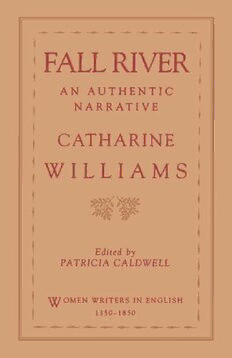
Fall River: An Authentic Narrative (Women Writers in English 1350-1850) PDF
193 Pages·1993·8.378 MB·English
Most books are stored in the elastic cloud where traffic is expensive. For this reason, we have a limit on daily download.
Preview Fall River: An Authentic Narrative (Women Writers in English 1350-1850)
Description:
Catharine Williams (1787-1872) lived most of her life in Rhode Island, where she supported herself and her daughter by a productive literary career. Her most compelling work, Fall River, last published in 1833, recreates a notorious incident in the ill-fated town of Fall River, Massachusetts: the trial of a Methodist minister for the murder of a pregnant mill worker whom it was suspected he had seduced. Williams's investigative report offers a vivid contemporary view of the lives of poor "factory girls" and of clerical corruption in the industrial towns of early New England. While based in fact, the book raises themes of sexual and religious hypocrisy and exploitation that may be compared with those of novels like The Coquette, Uncle Tom's Cabin, and The Scarlet Letter. At the same time, the author's mixture of journalism, biography, fiction, and exhortation makes this "authentic narrative" an unusual challenge to traditional notions of literary form and yields fresh insights into the nature of early American women's writing.
See more
The list of books you might like
Most books are stored in the elastic cloud where traffic is expensive. For this reason, we have a limit on daily download.
